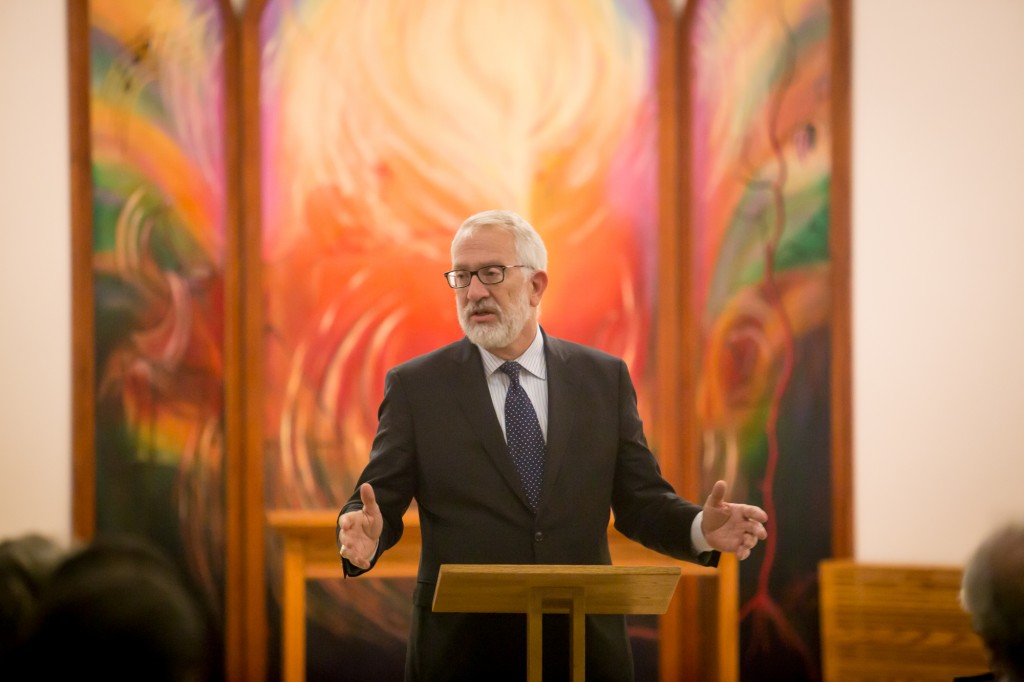Mark Earley regrets some of his criminal justice decisions from his time as a state senator and attorney general of Virginia.
“I feel like I’m spending the second half of my life making up for the first half,” Earley told more than 120 people gathered Tuesday at Eastern Mennonite Seminary for a presentation on mass incarceration.
Earley, a Republican, was in the state Senate from 1988 to 1997, served as attorney general from 1998 to 2001 and is now co-chairman of Democratic Gov. Terry McAuliffe’s Commission on Parole Review.
He is also is a member of Right on Crime, a national conservative organization dedicated to criminal justice reform. The Center for Justice and Peacebuilding at Eastern Mennonite University invited Earley to speak.
Growing concern
Incarceration rates became a contentious issue last year as Harrisonburg and Rockingham County officials sought ways to alleviate overcrowding at the Rockingham County Jail.
City Council and the Board of Supervisors decided to buy into the Middle River Regional Jail Authority in a deal that took effect in July.
Opponents of the deal said the city and county should invest in treatment for nonviolent offenders and other reforms, not buy more jail space. Earley said measures should be taken to reduce incarceration rates.
He said he is in favor of reinstating parole in Virginia, eliminating mandatory minimums sentences, keeping inmates close to their families so they have a support system and allowing community-based groups to help inmates to re-enter society.
“The paradigm of most prisons does nothing to help people come back to society,” Earley said. “It almost sets you up to fail.”
He also said criminalizing drug addiction is not helping anyone, and the state needs to invest in helping addicts instead of imprisoning them.
Earley also said judges should be required to visit a prison once a year to “see where they are sending people.”
‘Tough on crime’ measures were successful
As attorney general and a state senator, Earley supported many “tough on crime” measures — such as eliminating parole in 1995, and lowering the age juveniles can be tried as adults from 16 to 14 in 1994 — that contributed to increased incarceration rates in Virginia.
“We were scarily successful at putting a lot of people in jail,” Earley said.
According to a Bureau of Justice Statistics study, in 2013, Virginia incarcerated 36,982 people in prison as opposed to 24,822 in 1994, a 49 percent increase. According to the National Institute of Corrections, Virginia’s prison population per 100,000 people was 446 in 2013, or 13 percent higher than the national average, despite the commonwealth’s relatively low crime rate.
As a state senator and later as attorney general, Earley said he didn’t think much about prisoners. That changed when he started visiting prisons to help inmates re-enter society.
“I viewed prisoners as something other,” Earley said. “When I went into prisons, I saw them as human beings.”
The public discussion after Earley’s presentation mentioned the “abuse and lose” rule that he advocated for.
The law, instituted in 2001, revoked driver’s licenses of people who abused drugs even if their conviction had nothing to do with driving.
“The thought was … we’ll send a message,” Earley said. “Guess what? People who use drugs don’t function well on getting messages.”
This article was reprinted from the Oct. 21, 2015 Daily News-Record.
